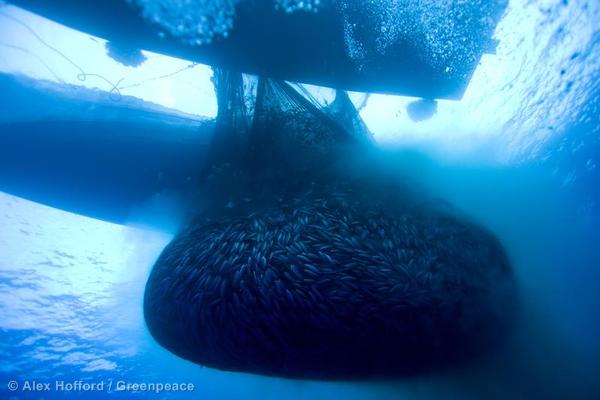This week Congress deliberated a proposal to weaken the best thing American ocean species have going. The Magnuson-Stevens Act, which is renewed every five years, is directly responsible for the recovery of dozens of marine populations once devastated by rampant overfishing. Updates to the act, proposed by Congressman Doc Hastings, are set to turn the clock back to bygone days of wanton and foolhardy extraction. The Empty Oceans Act would not only be disastrous for ocean ecosystems, it would endanger the livelihoods of the fishing communities who depend upon the sustainability of American waters.
But dont take our word for it. This post from guest blogger Sean Cosgrove, Director of Ocean Campaigns at the Conservation Law Foundation, lays it all out:
Rep. Hastings Empty Oceans Act Is a Surefire Disaster for New Englands Ocean, Fisheries, and Communities
Tomorrowmorning in the nations capital the House Natural Resources Committee will convene todeliberate a discussion draft of a bill to revise the Magnuson-Stevens Act(MSA). The MSA is designed to be revised every five years, and that time has come again. After oversight hearings by both the House and the Senate last year, Natural Resources Committee Chairman and Congressman from Washington Doc Hastings has made the first legislative effort to put pen to paper. My advice to the Chairman is to scrap his bill and start over.
Simply put, the Hastings draft ignores the state of New Englands fisheries and the need to move modern fishery management forward. Instead of recognizingthe success of the MSA over time,as well as recentimprovements to the law to end overfishingand rebuild depleted fish populations, the Hastings draft bill drags fisheries management back into the dark ages, with a handful of attention grabbing measures which, if enacted, would take modern fisheries management to a permanent state of overfishing.
Hastings Empty Oceans Act proposes to:
- Allow overfishing to continue by delaying rebuilding measures for as long as seven years. Once rebuilding measures for one targeted species finally starts, they could extend for decades with no meaningful deadline for completion.
- Allow fishery management councils to outright ignore recommendations from their own science and statistical committees in setting catch limits. Under this proposal the huge short-term economic pressure that the New England Fishery Management Council constantly suffers to increase catch limits on commercially targeted species from cod, to monkfish, to scallops, to sea herring would overwhelm the results of stock assessments, hard data, and science-based management.
- Exempt fisheries management from meaningful environmental review. Chairman Hastings has had a long-time goal of undercutting the National Environmental Policy Act (NEPA) and its provisions for environmental impact review of federal management. He also seems to have something against the involvement of citizens and other stakeholder groups. Responsible fisheries management and the publics interest do not benefit from reducing transparency and stakeholder involvement.
- Allow commercially driven fishery management councils to have control over the recovery of threatened and endangered ocean wildlife such as sea turtles.Hastings has had it out for the Endangered Species Act(ESA) since he was a freshman member of the House Endangered Species Reform Task Force in1995. This draft bill just became a vehicle for the Chairmans desire to undercut the ESA.
- Undercut other bedrock conservation laws, such as the National Marine Sanctuaries Act, as well as prohibit taxpayer-funded data from being used for New Englands regional ocean planning effort that has been underway for several years. With the success that Rhode Island and Massachusetts have had in developing state-based ocean plans, and the deep interest that all coastal states and many communities have in developing an ocean-based wind energy industry in New England, how does it make sense to restrict any information that would put fishermen and the fishing industry on the best possible footing in a regional ocean plan?
If you have followed New England fisheries in the news the last few years you will be aware of two apparent truths: 1)The New England region has some of the richest fisheries in the nation.2)New England fishermen are broke and are on the edge of bankruptcy.TheNorth Atlantic scallop fisheryis a model of economic success stemming from improvements in science-based management, whereas theNew England Atlantic cod fisheryrepresents a disastrous litany of attempts to continue overfishing and delay responsible management measures, such as habitat protection, reducing bycatch and protecting the forage base that many other species rely upon.
Inside each of these New England fishing stories sits strong evidence of how Congress needs to lead on the reauthorization of the MSA. Todayyou can hardly buy an Atlantic cod on Cape Cod, but two of the top three fisheries in the nation are New England scallops and Maine lobsters. Now 67% of Massachusetts fisheries revenue comes from sea scallops and lobsters, and 80% of Maines revenues come from lobsters alone. These are both species that arehighly susceptible to warming temperaturesandocean acidification.New England needs to rebuild its other fisheries to biological and economic health as quickly as possible so that the risks to the regions fishing economy are reduced. Further delays in the guise of management flexibility is a fools game: not a single overexploited fishery in this country is economically healthy.
New England needs an MSA reauthorization bill that promotes the long-term health and productivity of our ocean by establishing ecosystem-based fisheries management. We dont need a political bill that is designed to be an election year platform.
Please help stop this damaging legislation. Sign the petition and tell Congress to reject the Empty Oceans Act. We cant afford to let overfishing destroy our ocean ecosystems and the sustained livelihoods of Americans who depend upon them.
Sean Cosgrove’s post originally appeared in Talkingfish.org.



